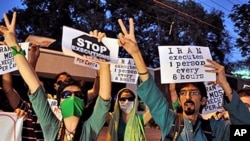Thousands of Iranian opposition activists rallied in support of popular uprisings in Tunisia and Egypt Monday, while a semi-official Iranian news agency said one person was killed and several wounded by protesters in the capital, Tehran.
Witnesses say security forces, many of them on motorbikes, fanned out across central Tehran Monday as opposition groups demonstrated despite a protest ban. Hundreds of black-clad Iranian riot police fired tear gas and paintball guns to disperse the crowds.
Iran's semi-official Fars news agency said what it called "seditionists" had shot a bystander dead at the Tehran rally.
Opposition leader Mir Hossein Mousavi's Kaleme website reported that "Tehran security forces arrested dozens of protesters." There was no official confirmation of the detentions. Mousavi's website and that of fellow reformist leader Mehdi Karroubi said security forces surrounded their homes, preventing the two men from joining the march. Authorities also cut telephone lines at Mousavi's house.
Some demonstrators chanted "death to the dictator" - a slogan used by protesters against President Mahmoud Ahmadinejad after the disputed 2009 presidential election. By late evening Monday, chants echoed from Tehran rooftops, as they did during the unrest two years ago.
U.S. Secretary of State Hillary Clinton said the United States "very clearly and directly" supports "the aspirations of the people who are in the streets of Iran today."
Clinton pressed the Iranian government to follow Egypt's example and "open up" its political system, reaffirming U.S. calls for non-violence, human rights and democratic political change. She called the protests a testament to the "courage" of the Iranian people and "an indictment of the hypocrisy of the Iranian regime."
Iranian Supreme Leader Ayatollah Ali Khamenei has praised this year's revolts in Egypt and Tunisia as an Islamic awakening, akin to the 1979 revolution that ousted Iran's U.S.-backed shah. But the regime has tried to suppress opposition at home. It warned the reformists against proceeding with Monday's rallies, calling them a ploy to mobilize anti-government protests and revive the Green movement.
Demonstrations were also reportedly held in other cities across Iran, including Isfahan, Shiraz and Kermanshah.
British Foreign Secretary William Hague called on Iranian authorities to exercise restraint and allow people to express their views freely.
Turkish President Abdullah Gul, on a visit to Tehran, urged Middle Eastern governments to listen to the demands of their people, although he did not mention Iran directly.
Mousavi and Karroubi headed the 2009 protests. The two reformists ran against Mr. Ahmadinejad and accused him of rigging the vote, a charge the government denies.
The 2009 protests ended in a violent crackdown by Iranian militiamen loyal to the clerical establishment. Scores of people were killed and wounded during demonstrations that lasted several months.




